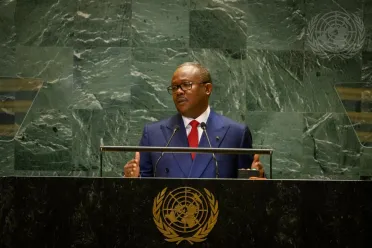Statement
Statement summary
ÚMARO SISSOCO EMBALÓ, President of Guinea-Bissau, said that, amid a backdrop of grave challenges, devastating wars and hundreds of millions of people in extreme poverty, “implementing reforms in global economic and financial governance to make it more just, inclusive and equitable has become even more urgent. This is the only way to build adequate responses to the challenges that humanity faces.” Calling for both concrete actions to finance development programmes and environmental protections, he turned attention to the Security Council: “Eight decades after the establishment of the UN in 1945, we live today in a totally different world,” he said, noting that Security Council reform must consider African interests under the terms of the Ezulwini Consensus and the Sirte Declaration of Heads of State and Government of the African Union. Moreover, international financial architecture must be reformed to promote greater inclusion, particularly in Africa, he continued, spotlighting the African Union’s Agenda 2063.
Guinea-Bissau is committed to national reconciliation, democracy, the rule of law and sustainable development, he continued. Despite the challenging global economic landscape, his country has seen growth thanks to its public policies, accountability and transparency. Measures bolstering the private sector have created a more inclusive economy, and women and youth entrepreneurship is promoted in turn, he said, also highlighting investment in constructing and improving basic infrastructure. “We declared war on corruption and organized crime,” he added, which restored trust from global financial institutions and multilateral and bilateral partners. In cultivating foreign relations to build peace, he recalled visits to the Russian Federation, Ukraine, Israel and Palestine, also reiterating Guinea-Bissau’s call to lift the unjust embargo that Cuba has been subject to for decades.
Speaking in his capacity as President of the African Leaders Malaria Alliance, he highlighted significant progress and the ambition to replenish the Global Fund. Under his tenure, he oversaw partnering with the private sector to produce medications and mosquito nets as well as encouraging technology transfer to African companies and established councils and funds, he recalled. Despite all this, the Alliance will be at a $1.5 billion deficit in the next three years, he said, pointing out that global warming will only expand the geographic reach of mosquitos and expose 170 million more people to malaria in Africa. In closing, he reaffirmed his country’s determination to promote international cooperation, calling for the peaceful resolution of conflicts and an end to suffering of innocent populations.
Full statement
Read the full statement, in PDF format.
Photo

Previous sessions
Access the statements from previous sessions.
